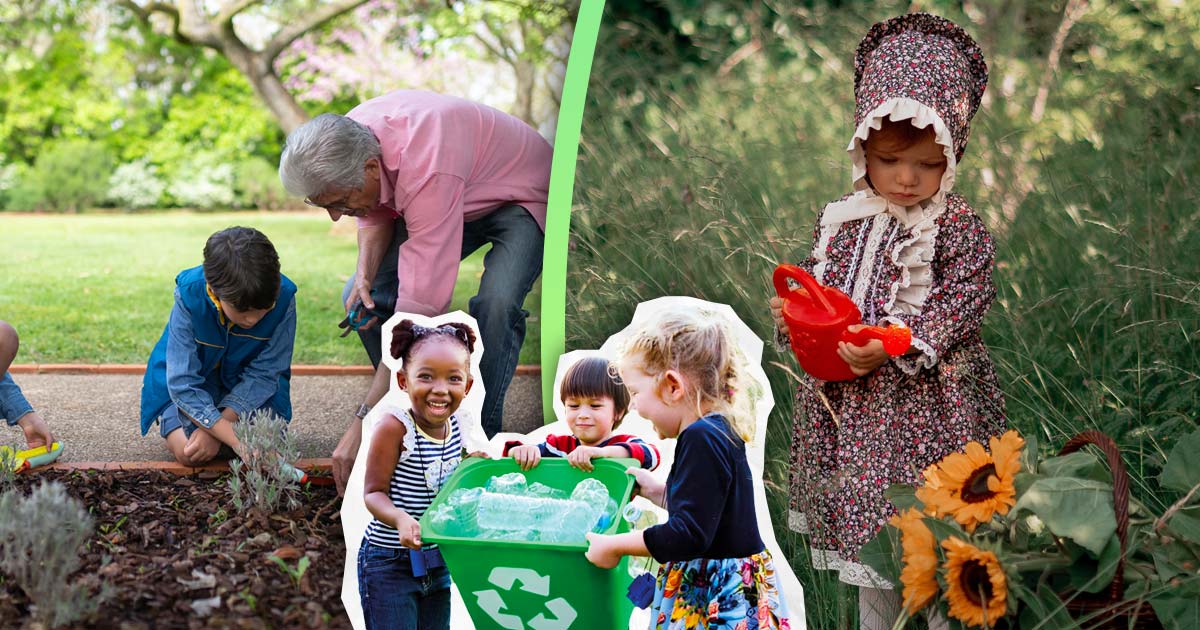Eco Parenting – Embracing Sustainable Choices for a Greener Future

In today’s world, where environmental concerns are increasingly at the forefront, sustainable parenting has become more than just a trend; it is a vital approach to raising children with a focus on the well-being of both the individual child and the planet they will inherit. Sustainable parenting acknowledges the interconnectedness of our actions and their environmental impact. Parents can shape a greener, healthier future for their children by making conscious choices that minimize our ecological footprint.
Green parenting goes beyond simply providing for the immediate needs of our children; it involves nurturing their lives in a way that aligns with the principles of environmental sustainability. This article delves into the principles and practices of sustainable parenting, providing valuable insights and practical tips for parents who wish to embrace an eco-conscious lifestyle.
Whether you are a parent, guardian, or caregiver, this article will serve as a comprehensive guide, offering practical advice and inspiration for incorporating sustainable practices into your daily lives. Together, let us embark on this journey of eco-parenting and make a positive difference for our children, the planet, and future generations.
1. Understanding Sustainable Parenting
Sustainable parenting, also known as eco-parenting or green parenting, involves incorporating environmentally-friendly practices into various aspects of child-rearing. It encompasses food, clothing, transportation, energy consumption, waste management, and more choices. The aim is to minimize the ecological footprint while nurturing children’s well-being and teaching them the importance of environmental stewardship.
2. Eco-Friendly Choices for Food & Nutrition
Food plays a crucial role in sustainable parenting. Opting for locally sourced, organic, and seasonal produce reduces the carbon footprint associated with long-distance transportation and chemical-intensive farming. Embracing plant-based diets or reducing meat consumption further promotes sustainability. Additionally, growing a backyard garden or participating in community-supported agriculture (CSA) programs can teach children the value of self-sufficiency, healthy eating habits, and environmental stewardship.
3. Conscious Consumerism – Sustainable Products & Clothing
Choosing sustainable products and clothing is another integral part of eco-parenting. Opt for eco-friendly and non-toxic baby care items, toys made from sustainable materials, and clothing made from organic fabrics. Consider buying second-hand items or participating in clothing swaps to reduce waste and encourage the circular economy. Emphasize quality over quantity, opting for durable products that can be passed down or reused. We instill a sense of responsibility towards the environment by teaching children the importance of conscious consumerism.
4. Eco-Conscious Transportation
Green transportation choices significantly impact the environment. Walking, biking, or using public transportation whenever possible instead of relying on private vehicles. Carpooling with other families or organizing a school bus system can reduce emissions and foster a sense of community. Electric vehicles are also a sustainable option to consider. Encourage children to develop an appreciation for nature by spending time outdoors and exploring their surroundings on foot. By prioritizing eco-conscious transportation, we reduce pollution and promote healthier lifestyles.
5. Energy Conservation & Waste Management
Teaching children about energy conservation and waste management instills lifelong habits contributing to a sustainable future. Practice energy-saving techniques such as turning off lights when not in use, using energy-efficient appliances, and reducing water consumption. Implement recycling programs at home, compost food scraps, and encourage the use of reusable containers and bags to minimize waste generation. Engage children in activities demonstrating the importance of resource conservation and encourage them to find creative ways to reduce, reuse, and recycle.
6. Nature-Based Learning & Outdoor Activities
Nature-based learning and outdoor activities provide numerous benefits for children’s development while fostering an appreciation for the environment. Engage in nature walks, camping trips, gardening, and other outdoor adventures. Create opportunities for hands-on experiences with plants, animals, and natural ecosystems. Encourage curiosity, environmental awareness, and a sense of responsibility towards the Earth. By allowing children to connect with nature, we foster a deep understanding of the interdependence between humans and the environment.
7. Raising Eco-Conscious Citizens
Sustainable parenting is not just about individual choices but also about raising environmentally conscious citizens. Educate children about the importance of environmental protection, climate change, and sustainability. Involve them in age-appropriate activities like beach cleanups, tree plantings, or volunteering for environmental organizations. By empowering them to take action, we nurture their sense of agency and commitment to preserving the planet. Encourage open discussions about environmental issues, inspire critical thinking, and support their initiatives for positive change.
Getting To Know More About Sustainable Parenting
Sustainable parenting is not just about its immediate impact on our families; it is about creating a ripple effect that extends beyond our homes and into the wider world. By embracing eco-conscious choices in various aspects of parenting, we can instill values of environmental stewardship, resilience, and empathy in our children.
Nature-based learning is a powerful tool in sustainable parenting. By providing opportunities for our children to connect with nature through outdoor activities, gardening, or nature walks, we foster a deep appreciation for the Earth’s beauty and biodiversity. These experiences nurture a sense of wonder and inspire a desire to protect and preserve the natural world.
Ultimately, sustainable parenting is about raising eco-conscious citizens who understand their role as stewards of the Earth. By educating our children about the importance of environmental protection, climate change, and sustainability and involving them in age-appropriate activities that allow them to take an active role, we empower them to become agents of positive change.
As parents and caregivers, we hold an incredible responsibility and opportunity to shape the future of our planet through the choices we make every day. Sustainable parenting empowers us to take meaningful action toward creating a better world for future generations. By consciously embracing eco-conscious decisions in various aspects of our parenting journey, we reduce our ecological footprint and impart invaluable lessons to our children about respecting and caring for the Earth.
Through sustainable parenting practices, we become role models for our children, demonstrating the significance of living in harmony with nature and making choices that prioritize the well-being of our planet.
